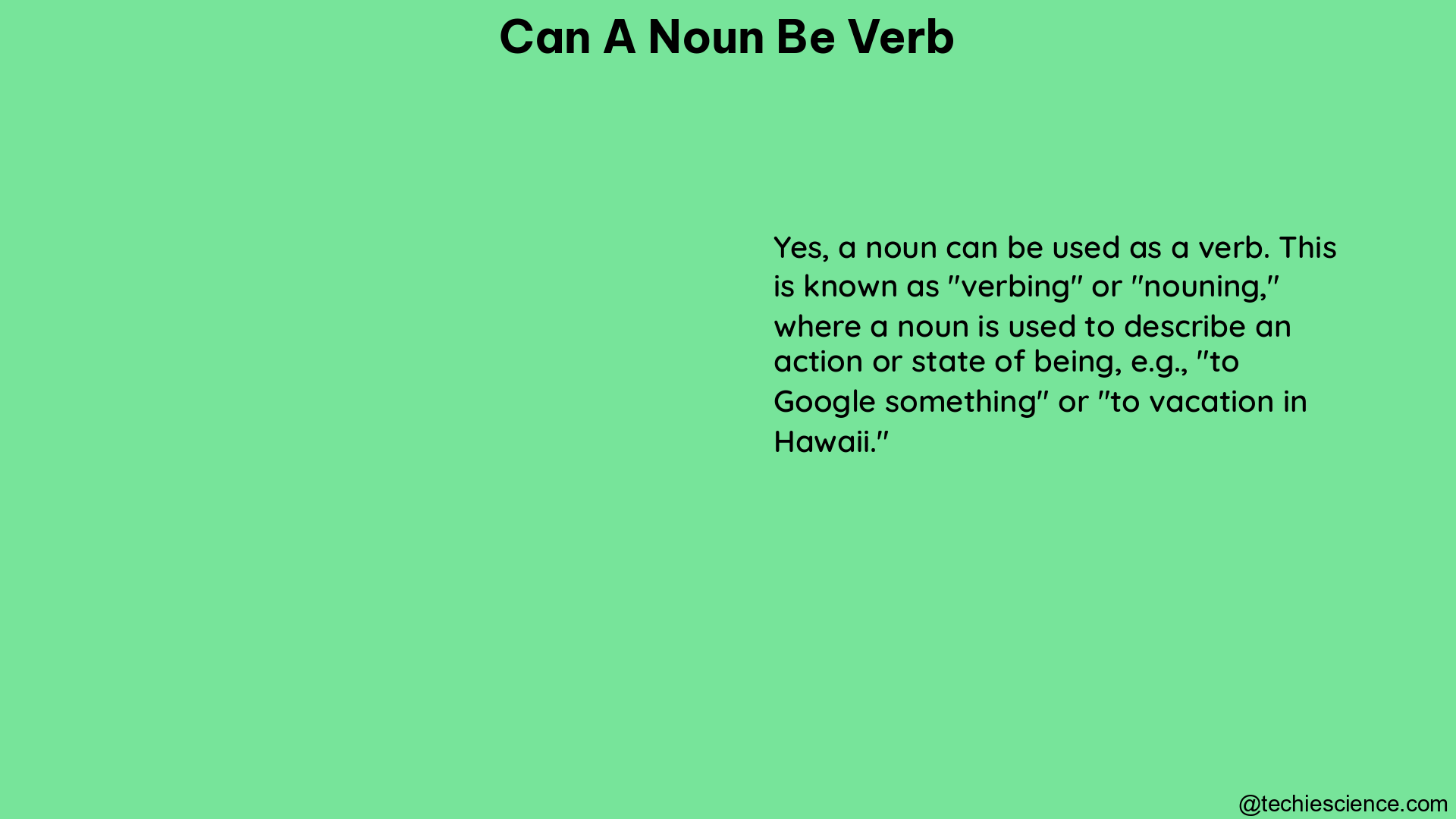Yes, a noun can be used as a verb in English. This process is known as “verbing” or “verbification.” Verbing involves using a noun in a verb position within a sentence, often by adding verb-like suffixes or prefixes to the noun. This can result in the creation of new verbs that were previously nouns.
Examples of Verbing
Nouns as Verbs
- Google: The noun “Google” is now commonly used as a verb, meaning to search for something on the Internet.
- Medal: The noun “medal” can be used as a verb, meaning to award a medal to someone.
- AirBnB: The noun “AirBnB” is now used as a verb, meaning to rent a home or condo through the AirBnB platform.
Gerunds
- Dancing: The verb “dance” can be used as a noun in the form of a gerund, as in “Dancing is fun.”
- Sacking: The verb “sack” can be used as a noun in the form of a gerund, as in “The sacking of the city was an epochal event.”
Grammatical Specification

Verbal Nouns
Verbal nouns are verb forms that function as nouns. Examples include gerunds (e.g., “dancing”) and infinitives (e.g., “to be”).
Gerunds
Gerunds are verb forms ending in “-ing” that function as nouns. Examples include “dancing,” “singing,” and “writing.”
Deverbal Nouns
Deverbal nouns are nouns formed from verbs through derivational processes like suffixes or simple conversion. Examples include “discovery” from the verb “discover” and “love” from the verb “love.”
Theoretical Explanation
Verbing is a common process in the English language, where nouns are converted into verbs to create new meanings or to simplify expressions. This process is often driven by cultural and technological changes, as seen in the examples of “Google” and “AirBnB.” The use of nouns as verbs can be seen in both formal and informal writing, although in formal writing, it is generally recommended to use established verbs to maintain clarity and precision.
Advantages and Disadvantages of Verbing
Advantages
- Linguistic Flexibility: Verbing allows the language to adapt to new concepts and ideas, making it more expressive and dynamic.
- Conciseness: Verbing can simplify expressions by using a single word to convey a meaning that would otherwise require a longer phrase.
- Creativity: Verbing can lead to the creation of new and innovative language, which can be seen as a sign of a vibrant and evolving language.
Disadvantages
- Ambiguity: The use of nouns as verbs can sometimes lead to ambiguity, as the meaning of the word may not be immediately clear to the reader or listener.
- Formality: In formal writing, the use of nouns as verbs may be seen as informal or inappropriate, and it is generally recommended to use established verbs to maintain clarity and precision.
- Potential for Misunderstanding: The use of nouns as verbs can sometimes lead to misunderstandings, especially for non-native speakers or those unfamiliar with the language.
Conclusion
In conclusion, the use of nouns as verbs, or “verbing,” is a common and accepted practice in the English language. This process allows for linguistic flexibility, conciseness, and creativity, but it can also lead to ambiguity and potential misunderstandings, especially in formal writing. As with any linguistic phenomenon, the use of nouns as verbs should be considered carefully and used judiciously to ensure clear and effective communication.
References
- https://daily.jstor.org/in-which-we-science-why-nouns-become-verbs-because-language/
- https://ell.stackexchange.com/questions/276641/can-a-noun-be-used-as-a-verb
- https://en.wikipedia.org/wiki/Verbal_noun
- https://socratic.org/questions/can-a-noun-be-a-verb
- https://www.grammarly.com/blog/the-basics-of-verbing-nouns/

Hi! I am Bhabesh Sing. I have completed M.A in English, M.A in Vocal Music, and B.Ed. I am a creative writer. Currently, I am a Subject Matter Expert in English on this Platform.
Let’s connect through LinkedIn-https://www.linkedin.com/in/bhabesh-sing-660914ab